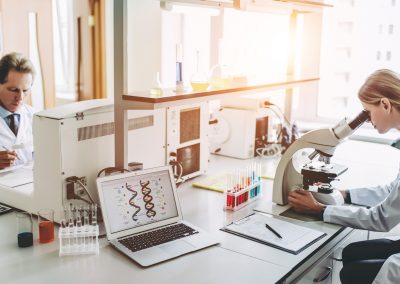Experts across a wide range of disciplines at Imperial College London have been – and are continuing – to keep government and society informed about COVID-19 and the coronavirus response, save lives through vaccines and testing – and providing solutions to protect the NHS.
Read the latest from Imperial’s COVID response here
- COVID-19 roadmap for reopening could lead to a third wave in England
- Modelling England’s route out of lockdown
- Read more here
The Human Challenge Programme
Is a partnership between Imperial College London, the Department for Business, Energy and Industrial Strategy (BEIS), hVIVO, a leading clinical company with expertise in viral human challenge models, and the Royal Free London NHS Foundation Trust. Read more It aims to see how COVID-19 the infection progresses and how drugs and vaccines could work against it.
Mar 2021 – The first participants recruited to the landmark trial were inoculated with a low dose of SARS-CoV-2, introduced via droplets in the nose, and carefully monitored by clinical staff in a controlled environment over a two-week period. They have now completed a period of quarantine at the Royal Free Hospital in London and will continue to be monitored by the clinical team. Read more.
“This is vital research to understand the course of disease in those with mild infections and to investigate the detailed natural history of SARS-CoV-2 infection.” Peter Openshaw, Professor of Experimental Medicine
COVID-19 vaccine Q&A – Feb 2021
Latest news, antibody tests and tackling new variants Professor Robin Shattock, head of the Imperial COVID-19 vaccine project, and Dr Katrina Pollock, clinical lead, discuss latest developments.
Imperial vaccine tech to target COVID mutations and booster doses – Jan 2021
“We want our technology to have the greatest impact. That means developing self-amplifying RNA technology to adapt to new variants, to boost other vaccines and to be deployed against future pandemic threats.” Professor Robin Shattock
Jul 2020 – COVID-19 vaccine candidate
As the first trials of Imperial’s COVID-19 / coronavirus vaccine candidate got underway in June, the team leading this pioneering work talk though the science of the vaccine and how they will find out whether it protects people from the disease.
In the video below, Professor Robin Shattock, Dr Katrina Pollock and Dr David Owen explain how the vaccine works, how it’s being trialled, and plans to help it reach populations around the world, if it proves to be effective in protecting people against COVID-19.
Coronavirus testing kits: DnaNudge
DnaNudge is a lab-free, rapid and reliable PCR test which delivers results in under 90 minutes developed by an Imperial startup, headquartered in White City. Originally designed to encourage healthier dietary choices for customers, the product has been adapted to test for COVID-19 with the government placing a £161 million order for 5.8 million DnaNudge COVID-19 test kits to be used in NHS hospitals from September in urgent patient care and elective surgery settings, with further deployments in out-of-hospital settings later on.
Companies and organisations such as the London Symphony Orchestra have also bought into the system to help them get back to work and embrace the New Normal.
The 90-minute COVID-19 test has been shown to have over 94 per cent sensitivity, and 100 per cent specificity in a new study, published in the journal The Lancet Microbe,
“You take a swab and put it in the cartridge and it doesn’t need any more handling, so you can do this in an A&E, on a ward, and you get much faster turnaround on that result…We have it now in eight hospitals in West London and we’re starting to use it to make clinical decisions…it has a very high certainty of detecting virus and also not giving a false positive result, so we can use that in real time to make decisions.” – Professor Graham Cooke, from the Department of Infectious Disease, advised Today Programme, BBC Radio 4 (From 0h 47m 35s)
From the outset, it has received a huge amount of media coverage, including pieces on the BBC, ITV’s Good Morning Britain, and the Daily Telegraph.
“I am hugely grateful to DnaNudge and their incredible work to innovate coronavirus testing, which will mean we can test millions more people in the coming months”. Matt Hancock MP, Health Secretary
Rapid test with point-of-care diagnostic device, QwikZyme,
Professor Molly Stevens (Departments of Materials and Bioengineering) and team are develop a rapid test able to detect ultra-low concentrations of the virus. The researchers aim to complete the development phase of the point-of-care diagnostic device, called QwikZyme, within the next six months and are working closely with Imperial College Healthcare NHS Trust to carry out clinical testing.
Professor Stevens’ team has extensive expertise in ultrasensitive biosensing and the integration of designer nanoparticles into rapid point of care tests.
Professor Stevens said: “Our rapid test design is for point of care use to help us overcome the challenge of detecting asymptomatic carriers, as well as diagnosing patients much earlier and more quickly. This would enable patients to be isolated and treated earlier, and help control the spread of outbreaks.”
JAMVENT – Ventilator for patients with breathing difficulties, associated with COVID-19
In response to the COVID crisis, Imperial’s experts in medical device design – and a clinician treating infected patients – designed a ventilator that can be built to meet MHRA and FDA requirements using generic parts.
JAMVENT provides a simple, low-cost solution to ventilator shortages worldwide, particularly for health services in developing countries. Plus the robust design also makes it suitable for long term use beyond current COVID-19 needs.
The design document for JAMVENT can be downloaded by those wishing to develop ventilators for their local healthcare providers. It includes a list of parts and a software spec – plus any further updates will also be made available. Enquiries from health organisations, manufacturers and donors interested in taking JAMVENT from design to manufacture are also welcome.
Dr Joseph Sherwood and Dr Jakob Mathiszig-Lee demonstrate JAMVENT.
PPE for healthcare workers
The Imperial College Advanced Hackspace and the NIHR Health Protection Research Unit developed, optimised and evaluated visors to ensure they were appropriate for use – and Imperial volunteers set about making more than 50,000 disposable visors for Imperial College Healthcare NHS Trust hospitals. Rolls Royce Motor Cars also provided the first 7,000 visors kits for the team to assemble .
Themed masks and engagement campaigns for workforces and students
With staff back in the workplace, the challenge is to keep ‘communities safe and minimise the spread of COVID19. Student consultancy – dreamteam – (led by Dyson School of Design Engineering’s Prof. Nick Munro) designed and create a range of high-tech, reusable face masks – with optional ear comforter. The theme of the collection and campaign – ‘Actions Speak Louder’ – is a call for students, by students, to wear masks and protect not only themselves and their community, but to be an example in how to adapt in difficult circumstances.
dreamteam are looking to help other organisations by creating themed / branded masks for their workforces and employee campaigns to evoke a ‘protect our team’ spirit during the COVID crisis and allay fears/issues of mask-wearing. Contact us to find out more.
New hand-washing solution could help halt spread of COVID-19 in developing world
Researchers at Imperial College London and the London School of Hygiene & Tropical Medicine (LSHTM) have designed a handwashing technology that could help halt the spread of COVID-19 and other deadly diseases by encouraging handwashing in developing countries where uptake is low.
A pilot study in Tanzania found that the new system, which is underpinned by behavioural science, prompted people who previously did not wash their hands to begin handwashing with soap on average one-to-two times a day. The new technology consists of single-use tabs of soap and various mechanisms for dispensing them and overcomes the limitations of ordinary soap because the tabs do not need to be shared and are designed only for handwashing.
The team have identified settings in which the solution will likely be an effective and commercially-viable intervention.
“We have behaviour change tools and methods to evaluate the efficacy of the approach elsewhere, and tell whether it will still be useful in other contexts. We want to pilot this in other low-income countries where this may be valuable, such as India.” Dr Weston Baxter, a behavioural designer in Imperial’s Dyson School of Design Engineering,
Imperial College COVID-19 Response Fund
This donor backed fund continues to help researchers, from a wide range of disciplines, win the battle against COVID-19. The latest projects to receive funding aim to…
- Speed up and enhance testing using nanotechnology and existing diagnostic instruments
- Support the NHS by addressing the discomfort of long term PPE use, adapting AI clinical decision support systems and investigating transmission risks to see when staff can return to work
- Analyse patient data and tissue to better understand the disease and explore already-licensed drugs to devise new treatments and therapies
In addition, Dr Georgiou and his team have developed a cutting-edge ‘lab on a chip’ diagnostic platform using microchip technology that can be paired with a smartphone app to rapidly identify whether a person is positive for SARS-CoV-2 RNA from a nasal or throat swab. The low-cost test could offer a portable alternative to lab-based testing, allowing patients to be diagnosed at the bedside, or in the community, in real time.
Tracking trends and learning about disease
- More than 100,000 patients with COVID-19 have so far been enrolled in a UK-wide study to learn more about the disease. Hear more From Professor Openshaw.
- Home testing for coronavirus to track levels of infection in the community
- The REACT programme, commissioned by the Department of Health and Social Care, is monitoring how the virus is spreading across the country.
- A separate study by the Department of Mathematics is tracking COVID-19 ‘hotspots’ as they emerge, to help inform local lockdown policies or introduce mitigation measures to stop the spread of infection
- Transport for London (TfL) have commissioned researchers from Imperial to measure potential infection hotspots across the London Underground as they demonstrate the safety of the network.
COVID-19 response Fund
The Imperial College COVID-19 Response Fund allows donors to fund high-impact projects in the university’s efforts to tackle COVID-19 and more than 860 people have donated so far.
Study of Italy’s Vo
“Our research shows that testing of all citizens, whether or not they have symptoms, provides a way to manage the spread of disease and prevent outbreaks getting out of hand.” Professor Andrea Crisanti
Jamil Research fund
The Community Jameel Imperial College COVID-19 Excellence Fund was launched in June 2020 to provide support for research projects into the impact, understanding, prevention, diagnosis, and treatment of COVID-19..
Testing Insights
The rate of COVID-19 infection in England dropped in June, despite some lockdown restrictions being eased, reveals second report from a major programme of community testing.
AI treatment for COVID-19 patients
Dr Brijesh Patel is leading a trial to test a new AI device to help monitor the lung physiology of patients with severe COVID-19 pneumonia.
Taking part in the COVID-19 vaccine trial
Video ‘catch up’ with a participant in Imperial’s COVID-19 vaccine trial after she receives her first dose, to see how she feels and why she decided to take part.
Who to contact:

Jamie Pombeiro de Sousa
Engagement Manager
For Bioengineering, Mechanical Engineering, Computing, Cyber Security, Data Science and AI




